HOW TO STAY ON TRACK WITH YOUR DIET DURING THE HOLIDAYS
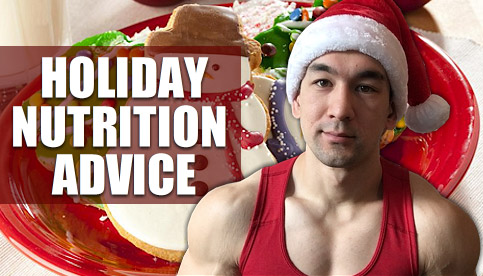
Consistently managing your nutrition plan during the regular year requires enough focus as is, but during the holidays it can be particularly challenging.
What’s the best way to stay on track with your fitness program despite all the delicious high calorie foods and drinks you’ll be surrounded by?
Well, assuming that you do celebrate the holidays and that the food aspect is something you enjoy, my first and main piece of advice here is to allow yourself to relax and to not take things too seriously during this time.
Wanting to remain consistent with your muscle building and fat loss goals is understandable, but don’t lose sight of what the holiday season is really all about: kicking back and enjoying time with your friends and family.
Heavily restrict yourself and begin obsessing over every single calorie going into your mouth and all you’ll be doing is adding a big layer of additional stress to all of your social events and family gatherings that really doesn’t need to be there.
Years from now when you look back on your life and ponder the things you might have done differently, tracking macros on Christmas Eve with greater accuracy probably isn’t going to make the list.
That said, I do recognize that everyone is different and has varying goals and perspectives, so how you specifically choose to handle your nutrition at this time of year is ultimately up to you and will depend on your personal situation.
Here are the 3 main options you’ll be looking at along with some useful holiday diet tips you can employ…
Option #1: Continue Accurately Tracking Everything As Normal
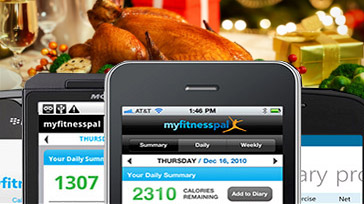
This would be the more “extreme” route when it comes to dieting during the holidays and would apply to those who have made up their mind that maintaining their fitness plan truly is their number one priority.
Maybe you’re preparing for a fitness competition or need to be in a specific shape by a certain date, or maybe the holidays just aren’t a big deal to you and you have no real desire to indulge in the first place.
In that case, you can simply stay on track with your diet as normal by knowing what your daily calories and macros are, accurately tracking them regardless of the situation, and using basic willpower to stay within your limits.
It’s not the approach that I would personally choose or recommend to most average trainees, but there’s of course nothing wrong with it if you’ve decided that it’s the right option for you.
Option #2: Fully Let Go And Stop Tracking Altogether
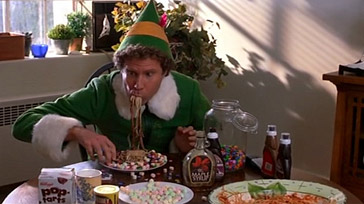
This approach falls on the opposite end of the spectrum, and that is to just go “all out” and eat whatever you feel like in whatever amounts you’d like with no regard for calories whatsoever.
Probably not the best route for most people, but there’s still nothing objectively “wrong” with this as long as you’re aware of what you’re doing, why you’re doing it and what the potential consequences might be.
How an intentional “holiday binge” would specifically affect your fitness goals really just comes down to exactly how many calories you’re going over by and for what length of time.
For example, if we’re only talking about a few days here and there and you aren’t going completely off-the-charts-insane with your food choices and volume, then the impact would likely be very minor if anything.
On the other hand, if you end up uncontrollably stuffing your face for 2 or 3 weeks straight and you are going significantly high on total calories, then yes, it will of course affect your physique and you will gain some unwanted body fat.
Now, is this really a big deal?
Depending on the person, it may or may not be.
If you’re still a beginner and an all-out holiday binge ends up erasing a good portion of the progress you’ve made, and that causes you to lose motivation and fall off track in the bigger picture, then yes, that could certainly have some serious negative consequences for you.
Conversely, a more experienced trainee may have no problem at all with intentionally putting on a couple pounds of fat over the holidays and then simply dieting it off for a week or two when January rolls around.
In any case, the key factor of importance with this particular approach is awareness.
Mindless over-eating is pretty much never going to be a smart idea, but if you’re doing it consciously over a temporary period of time and understand the upsides/downsides involved, it can still be a viable option as long as you have a proper plan for getting back on track once it’s over.
Option #3 (Recommended): Find A Healthy Middle Ground Between The Two
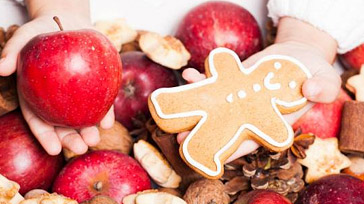
While either of the two options above can work fine for some people depending on the circumstances, a reasonable middle-ground between the two will probably be best for most trainees in most situations when it comes to dieting during the holidays.
In other words, this means allowing yourself to relax and loosen things up nutrition-wise, enjoying those holiday foods and drinks without unnecessary guilt, but at the same time being conscious of what you’re doing and not going too far overboard with it.
Keep in mind that it’s not only about how those excess calories will affect your progress here and now, but also how it may affect you once the holidays are over in terms of maintaining your motivation and focus moving forward.
As far as practical steps go, here are a few useful holiday nutrition tips you can follow to stay on track with your diet at Christmas and New Years without getting overly stressed about things…
Holiday Diet Tip #1: Calorie Intake
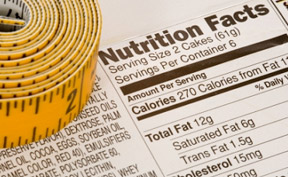
If you’re currently in a cutting phase and are trying to lose fat, one good approach is to simply treat the holidays as a 1-2 week “diet break” where you eat roughly around your calorie maintenance level or in a small surplus.
This isn’t going to negatively impact your results (even if you do eat in a surplus, a good portion of those calories will be diverted to lean muscle growth as long as you continue to weight train), and if you’ve been in a deficit for a while then a diet break can be a useful tool to give you a nice physical and mental reset.
Continuing to maintain a calorie deficit is still an option, and it just depends on how involved the “eating aspect” is for you during the holidays and how much importance you place on it. If you want to continue losing fat and can comfortably remain in a deficit without feeling overly restricted, by all means go ahead.
If you’re currently in a bulking phase and are already eating in a calorie surplus, you can simply keep that surplus in place or be a bit more generous with it for a week or two if you’d like.
Also keep in mind here that your net gains or losses in body weight will ultimately come down to your average calorie intake over the course of a few days or the week as a whole as opposed to your calorie intake in individual blocks of 24 hours.
Fat loss and muscle growth are not immediate “on/off” switches, and it’s your total net energy balance in the larger picture that will determine your overall results.
So, if there are certain days where you know your intake will be particularly high, one option is to simply lower your calories slightly on the surrounding days in order to balance things out.
For example, if your program calls for a daily 300 calorie surplus but you were planning to eat in a 1200 calorie surplus on New Years Eve, you could eat at maintenance for a day or two before and a day or two after and the result would be roughly the same.
Holiday Diet Tip #2: Caloric Tracking
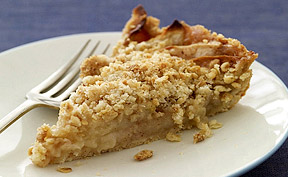
Since many of the items you’ll be eating around the holidays will likely be homemade, specifically tracking their nutritional content can pose a bit of a challenge.
Your best bet is to just roughly estimate things while keeping in mind that being a few hundred calories off is really no big deal in the short term.
Again, building muscle and losing fat is all about the big picture, so don’t stress yourself out too much trying to nail down the exact calories and instead just try to approximately ballpark things.
If you do want to be a bit more precise, just take whatever particular homemade item you’re eating and then look it up using a nutrition database such as MyFitnessPal or CalorieKing.
For example, if you were having a homemade slice of apple pie, you could search for the calorie and macronutrient content online and just use that as an estimation.
It’s definitely not going to be perfect, but it doesn’t need to be either.
And as a side note, if we’re just talking about a few days here and there where your food intake will be higher than normal (such as Christmas Eve, Christmas day and New Years), I wouldn’t even worry about specifically tracking anything aside from some very basic eye-balling.
You’ll be better off to just enjoy yourself and not worry about it, as going over on calories for a single day here and there is not going to be enough to have any real detrimental effect anyway.
Holiday Diet Tip #3: Caloric Adherence
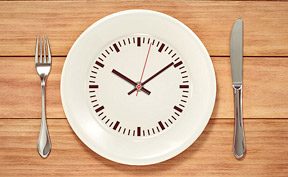
One final holiday nutrition tip you can use for days where you will be eating those higher calorie meals and snacks is to intentionally lower your intake earlier in the day as a way of “saving up” calories for later on.
An intermittent fasting approach where all of your daily calories are pushed into a smaller 6-8 hour feeding window is one option, or you can just make a conscious effort to eat a bit less earlier on in the day and a bit more later.
Spacing your food out in this way will reduce your chances of going overboard on total calories for the day as a whole.
This can also be done on a larger scale as well.
For example, you could eat fewer calories for an entire day or two leading up to a certain “high calorie event”, or you could even take it a bit further by lowering your intake for a full week or two leading up to the holiday season itself.
Dieting During The Holidays: The Bottom Line

In the grand scheme of your life, you’re almost certainly going to derive more happiness and fulfilment from enjoying time with friends and loved ones than you will from having six pack abs.
Being dedicated to your fitness program is great, but so is overall life balance.
If holiday food and drinks are something you enjoy as part of family gatherings and other social events, don’t be afraid to kick back, relax and indulge a bit.
As long as you go about it mindfully and keep a rough tab on your food intake, you’ll be able to enjoy the season guilt free without negatively affecting your results.
If you found these holiday diet tips helpful, make sure to get your personalized training, nutrition and supplement plans using my free interactive video presentation below…
If you found this article helpful, make sure to sign up for your FREE custom fitness plan below...




